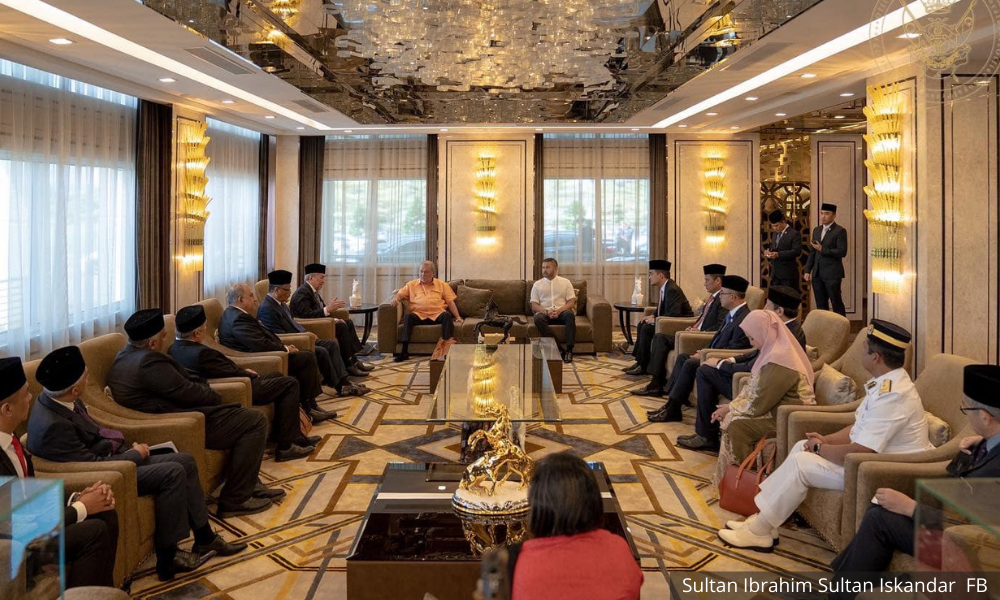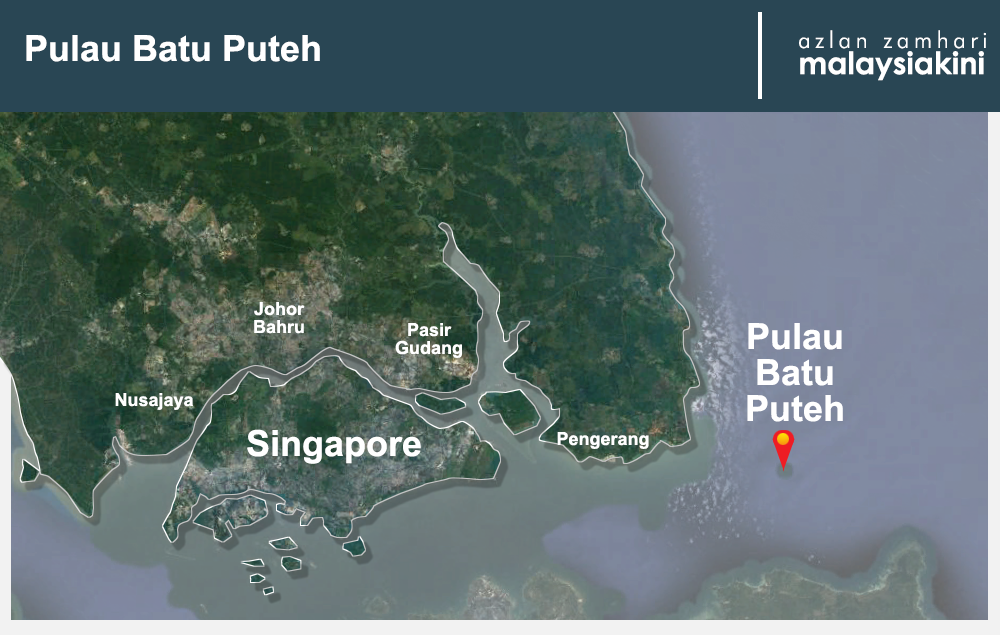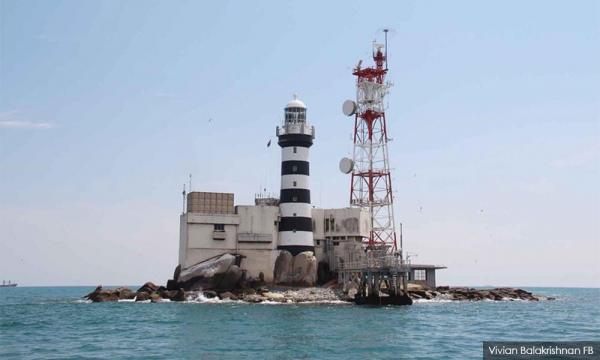COMMENT | On May 23, 2008, when the International Court of Justice (ICJ) in The Hague delivered its judgment on the territorial dispute between our country and Singapore, many Malaysians, especially Johoreans, felt disappointed that Batu Puteh had lost to Singapore.
The judgment is very painful because in the eyes of Malaysians the allegations made by Singapore, since the dispute emerged in 1980, have shown Singapore’s cavalier attitude in conducting relations with Malaysia and insensitivity to Malaysians.
Either way, Batu Puteh is located only a mere 7.7 nautical miles (14km) from the coast of Tanjung Penyusup, Johor compared to 25.5 nautical miles (44km) from Singapore.
The discovery of three documents at the National Archives of the United Kingdom between Aug 4, 2016, and Jan 30, 2017, has given Malaysians a new lease of life because these “new facts” have prompted Malaysia to apply for a review of the ICJ decision regarding Batu Puteh on Feb 2, 2017, under the BN government.
These documents include internal correspondence of the colonial authorities of Singapore in 1958, a report on an incident filed by a British naval officer in 1958 and a map with notes on naval operations from the 1960s which certify that Batu Puteh has not become part of the sovereign territory of Singapore during the period in question.
However, according to searches made in open source, it has been confirmed that the Pakatan Harapan government decided not to proceed with the revision application on June 11, 2018.
Coincidentally, this decision was made when the attorney—general then, Mohamed Apandi Ali, was instructed to take an unrecorded leave for 30 days starting from May 14 to June 14, 2018. And during that hiatus, Malaysia lost its sovereignty over Batu Puteh forever.

Singapore's sovereignty over Batu Puteh can no longer be challenged in any way because it is now time-barred by Article 61(5) of the ICJ Statute, which provides that “No application for revision may be made after the lapse of ten years from the date of the judgment”.
Thus, the allegation of possible negligence and wrongdoing was published; according to the media statement made by Ismail Sabri Yaakob, the 9th prime minister on Oct 13, 2022, based on findings made by the special task force on the law review of Batu Puteh.
This is because the actions have caused Malaysia to miss the opportunity to file a revision application against the ICJ judgment in 2018.
The question that arises now is why a decision that a major impact on national policy has that also involves national sovereignty is implemented in a hurry and without obtaining further views and advice from the International Affairs Division of the Attorney-General’s Chambers and all relevant stakeholders including the Foreign Ministry, Defence Ministry and the Johor government.
As a Johorean, I am deeply disappointed by this decision and questioned why Malaysia gave up its territorial rights so easily.
I agree with the recommendation of the special task force that action should be taken against the individuals involved.
This is notwithstanding that the international community may have the perception and view Malaysia as a country that does not maintain a consistent stand on this issue as a result of the launching and withdrawing of legal proceedings here.
I also urge the government to uphold the order of His Majesty Sultan Ibrahim Sultan Iskandar to make the report of the special task force public because this is a matter of Johor state sovereignty.

The rakyat of Johor has the right to know why the federal government at the time acted in such a way. Those who commit such negligence and mistakes must be brought to justice.
Malaysia should ensure that her rights as a sovereign country are fully defended by the government without compromise and this should be supported and maintained.
As many members of the public are still in the dark about what this is all about, I have prepared simple frequently asked questions (FAQ) on the subject matter.
Where is Batu Puteh?
Batu Puteh is a maritime feature approximately 14km south of Tanjung Penyusup, Johor and 44km east of Singapore.
So to whom Batu Puteh belongs?
Batu Puteh now belongs to Singapore. This is in furtherance to a dispute that both Malaysia and Singapore brought to the ICJ in 2003. In 2008, the ICJ held that Batu Puteh belongs to Singapore.
Does it mean Batu Puteh is part of Singapore although it is closer to Malaysia (our constituency)?
Yes.
What is the implication of the ICJ judgment that Batu Puteh belongs to Singapore?
The most apparent domestic implication here is that Batu Puteh is part of Singapore.
Beyond Malaysia, the legal implication here would be that Singapore will be able to claim territorial water around Batu Puteh, which under international law is upwards of 12 nautical miles. Seeing that both sides have set up the Malaysia-Singapore Joint Technical Committee (MSJTC) to determine our maritime boundary, this is still in the midst of negotiations.
Being part of Singapore, it falls under an MP constituency too, which they call the East Coast Group Representation Constituency. If Batu Puteh belonged to Malaysia, it would have been part of the Pengerang constituency.
Batu Puteh is so much closer to us. Did we take further actions to rectify the ICJ 2008 judgment?
Yes, we tried to. The previous BN administration attempted to seek a revision of the ICJ judgment in 2017 upon the discovery of new facts. The hearing is set for July 2018, but the previous Harapan administration decided to abandon the proceedings.
Why did the Harapan administration abandon the proceedings? It remains a mystery to us. All their ministers seem to be suffering from “selective amnesia” regarding that episode.
Will this affect my livelihood?
If you are a fisherman in Pengerang, yes. This is on top of the fishing area lost to the massive development of Petronas Rapid oil and gas refinery. Singapore now claims sovereignty over Batu Puteh, and its navy patrols the area. Since it is now part of Singapore, the fishing community can no longer fish within the vicinity of the area.
Are there broader security implications here?
Batu Puteh today has a lighthouse, a helipad, a desalination plant and more importantly a military rebroadcast station. Many of these seem to suggest that Singapore intends to establish Batu Puteh as an outpost with a military purpose of some sort.
Bear in mind, Batu Puteh is located at the eastern entrance of the Straits of Singapore. The security implication here is potentially immense.

News headlines in the recent past suggested that Singapore is embarking on land reclamation around Batu Puteh. What is this about?
Singapore in July 2021 announced its intention to embark on land reclamation 0.5 nautical miles (<1km) south of Batu Puteh. This reclamation is earmarked to be around 7ha, or approximately 10 football fields, supposedly to provide berthing facilities for vessels.
All these are done when the MSJTC has yet to finalise the delimitation of the maritime boundary between Malaysia and Singapore, which I would say is underhanded.
In broader terms, how does this affect us as Bangsa Johor?
If you would look closer at the news, this reclamation work will be carried out by the Singapore Housing and Development Board (HDB). If you are familiar with Singapore, you would know that the HDB is tasked to build homes and townships.
Now imagine Singapore having a settlement, or God forbid a town at our doorstep. This is certainly an affront to Bangsa Johor.
Isn’t it a bit too late to act against the individuals involved?
It will be dependent on the findings of the special task force which has yet to be made public. This adds to the reasons why it is imperative for the findings to be made public.
There is certainly a possibility that should fault be attributable to any individual, a declaratory relief could be sought for as a matter of recourse.
Who is accountable?
Hmmm…. for the withdrawal of the revision application to the ICJ occurred in June 2018, maybe all the cabinet ministers under the Harapan government then, on the basis of collective cabinet responsibility.
What can they be sued for?
The tort of misfeasance in public office.
What is the tort of misfeasance and can it be brought against the Harapan administration?
Misfeasance is one of the triumvirates of tortious liability of public officers embedded in the common law. Misfeasance means the improper doing of an act which the agent might lawfully do, or, in other words, it is the performing of his duty to his principal in such a manner as to infringe upon the rights and privileges of third persons.
Who can sue?
Legal action under the tort of misfeasance may be taken against the Harapan administration by those with locus standi, ie people of Johor and/or the Johor government.
It is for the courts to decide whether they have committed negligence and error for not proceeding with the application for review and interpretation of the Batu Puteh case.
What is the prospect of success of suing on the tort of misfeasance?
Mohd Hatta Sanuri has sued the previous Harapan government in the Kuala Lumpur High Court on the tort of misfeasance in May 2021. Regrettably, the court in July 2022 however has struck out the suit on the grounds that actions by the government are non-justiciable as it concerns foreign policy.
The court also ruled that Hatta lacked locus standi. For the local court to hold so, and the avenue in ICJ has been shut, this puts us in a Catch-22 situation, for there seems to be a lack of viable legal avenues to bring a case.
The special task force on Batu Puteh has presented its report to the cabinet. What’s next?
For we are now in a Catch-22 situation as mentioned above, the government should initiate a Royal Commission of Inquiry (RCI) via the Commission of Enquiry Act 19505 to independently investigate the loss of Batu Puteh and put to rest the events that occurred between Malaysia and Singapore since 1979.
An RCI will be effective for the act provides it with extensive powers to summon witnesses and documents. Any failure to do so would allow the RCI to issue a warrant of arrest to compel attendance.
This would enable the parties concerned, especially from the Harapan administration, to explain why they withdrew the application despite fresh evidence that favoured Malaysia’s sovereignty claim over Batu Puteh.
Those willing to compromise on the sovereignty of the country must be held accountable and the findings of the RCI should be made public.
AZALINA OTHMAN SAID is the incumbent Pengerang MP and head of BN legal bureau.
The views expressed here are those of the author/contributor and do not necessarily represent the views of Malaysiakini.


